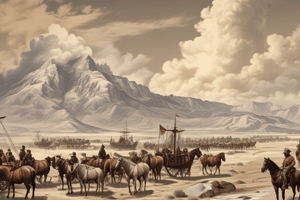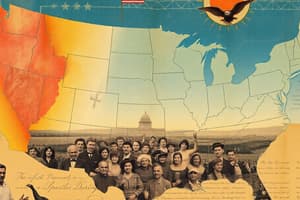Podcast
Questions and Answers
Manifest Destiny was a widely held belief in the 19th-century United States that its settlers were divinely ordained to expand across ______.
Manifest Destiny was a widely held belief in the 19th-century United States that its settlers were divinely ordained to expand across ______.
North America
The concept of Manifest Destiny gained traction in the ______, coinciding with a period of westward expansion.
The concept of Manifest Destiny gained traction in the ______, coinciding with a period of westward expansion.
1840s
Economic expansion was driven by the desire for new land, resources, and ______.
Economic expansion was driven by the desire for new land, resources, and ______.
markets
The ideology of Manifest Destiny was entwined with racial ideologies, including a belief in the inferiority of ______ peoples.
The ideology of Manifest Destiny was entwined with racial ideologies, including a belief in the inferiority of ______ peoples.
Manifest Destiny fueled tensions with ______, ultimately leading to conflict.
Manifest Destiny fueled tensions with ______, ultimately leading to conflict.
Critics of Manifest Destiny argued that the concept justified aggressive and unjust actions towards other ______.
Critics of Manifest Destiny argued that the concept justified aggressive and unjust actions towards other ______.
Challenges to Manifest Destiny came particularly from those who opposed the displacement of Native Americans and ______.
Challenges to Manifest Destiny came particularly from those who opposed the displacement of Native Americans and ______.
The legacy of Manifest Destiny includes both positive aspects like national growth and negative impacts such as ______ and injustice.
The legacy of Manifest Destiny includes both positive aspects like national growth and negative impacts such as ______ and injustice.
Prominent figures like John L. O'Sullivan articulated the idea of Manifest Destiny through ______.
Prominent figures like John L. O'Sullivan articulated the idea of Manifest Destiny through ______.
Manifest Destiny continues to be debated in ______ society.
Manifest Destiny continues to be debated in ______ society.
Flashcards
Manifest Destiny
Manifest Destiny
The belief that the United States was destined to expand across North America, driven by a sense of American exceptionalism and a mission to spread democracy and Protestantism.
Economic Expansion
Economic Expansion
A core motivation for Manifest Destiny, fueled by the desire for new land, resources, and markets to boost the American economy.
American Exceptionalism
American Exceptionalism
The belief in American cultural and political superiority, justifying expansion as a way to spread these values to other areas.
Racial Ideology
Racial Ideology
Signup and view all the flashcards
Religious Motivation
Religious Motivation
Signup and view all the flashcards
Westward Expansion
Westward Expansion
Signup and view all the flashcards
Conflict with Indigenous Peoples
Conflict with Indigenous Peoples
Signup and view all the flashcards
Territorial Acquisitions
Territorial Acquisitions
Signup and view all the flashcards
Criticisms of Manifest Destiny
Criticisms of Manifest Destiny
Signup and view all the flashcards
Legacy of Manifest Destiny
Legacy of Manifest Destiny
Signup and view all the flashcards
Study Notes
Definition and Origins
- Manifest Destiny was a widely held belief in the 19th-century United States that its settlers were divinely ordained to expand across North America.
- It emphasized the idea of American exceptionalism and the nation's role in spreading its political and social ideals, including democracy and Protestantism.
- The concept gained traction in the 1840s, coinciding with a period of westward expansion.
- Prominent figures like John L. O'Sullivan articulated the idea through writing.
Motivations and Ideology
- Economic expansion was a key driver, fueled by the desire for new land, resources, and markets.
- The belief in American superiority — its cultural and political values — played a crucial role.
- The concept was entwined with racial ideologies, including a belief in the inferiority of Indigenous peoples and Mexicans, justifying displacement and subjugation.
- Religious ideas motivated some proponents, viewing expansion as a mission to convert others to Christianity.
Manifest Destiny's Impact and Consequences
- The ideology fueled westward expansion and territorial acquisitions like the annexation of Texas and the Mexican-American War.
- It led to displacement and conflict with Indigenous peoples, resulting in significant loss of land and lives.
- It also fueled tensions with Mexico, ultimately leading to conflict and the acquisition of significant territories.
- The expansionist policies impacted American society, causing both national pride and social division.
Criticisms and Challenges of Manifest Destiny
- Critics argued that the concept justified aggressive and unjust actions towards other groups.
- The idea was seen by some as a tool for political ambition and economic gain.
- Challenges to Manifest Destiny came from various groups, but particularly from those who opposed the displacement of Native Americans and Mexicans.
- The concept's ethical implications were and remain controversial.
The Legacy of Manifest Destiny
- Manifest Destiny continues to be debated in contemporary society.
- Its legacy is complex, including both positive aspects like national growth and negative impacts such as displacement and injustice.
- Historians and social scientists analyze it in the context of American exceptionalism and the nation's historical relationship with other groups and countries.
Studying That Suits You
Use AI to generate personalized quizzes and flashcards to suit your learning preferences.




